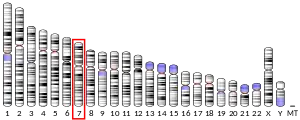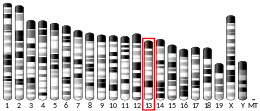NME8
Thioredoxin domain-containing protein 3 (TXNDC3), also known as spermatid-specific thioredoxin-2 (Sptrx-2), is a protein that in humans is encoded by the NME8 gene (also known as the TXNDC3 gene) on chromosome 7.[5][6]
Function
This gene encodes a protein with an N-terminal thioredoxin domain and three C-terminal nucleoside diphosphate kinase (NDK) domains, but the NDK domains are thought to be catalytically inactive. The sea urchin ortholog of this gene encodes a component of sperm outer dynein arms, and the protein is implicated in ciliary function.[5]
Clinical significance
Mutations in the TXNDC3 gene are associated with primary ciliary dyskinesia.[7]
References
- GRCh38: Ensembl release 89: ENSG00000086288 - Ensembl, May 2017
- GRCm38: Ensembl release 89: ENSMUSG00000041138 - Ensembl, May 2017
- "Human PubMed Reference:". National Center for Biotechnology Information, U.S. National Library of Medicine.
- "Mouse PubMed Reference:". National Center for Biotechnology Information, U.S. National Library of Medicine.
- "NME8 NME/NM23 family member 8 [Homo sapiens (human)]". Retrieved 3 June 2015.
- Sadek CM, Damdimopoulos AE, Pelto-Huikko M, Gustafsson JA, Spyrou G, Miranda-Vizuete A (Dec 2001). "Sptrx-2, a fusion protein composed of one thioredoxin and three tandemly repeated NDP-kinase domains is expressed in human testis germ cells". Genes to Cells. 6 (12): 1077–90. doi:10.1046/j.1365-2443.2001.00484.x. hdl:10261/47418. PMID 11737268. S2CID 20869820.
- Duriez B, Duquesnoy P, Escudier E, Bridoux AM, Escalier D, Rayet I, Marcos E, Vojtek AM, Bercher JF, Amselem S (Feb 2007). "A common variant in combination with a nonsense mutation in a member of the thioredoxin family causes primary ciliary dyskinesia". Proceedings of the National Academy of Sciences of the United States of America. 104 (9): 3336–41. doi:10.1073/pnas.0611405104. PMC 1805560. PMID 17360648.
Further reading
- Shi D, Nakamura T, Nakajima M, Dai J, Qin J, Ni H, Xu Y, Yao C, Wei J, Liu B, Ikegawa S, Jiang Q (2008). "Association of single-nucleotide polymorphisms in RHOB and TXNDC3 with knee osteoarthritis susceptibility: two case-control studies in East Asian populations and a meta-analysis". Arthritis Research & Therapy. 10 (3): R54. doi:10.1186/ar2423. PMC 2483443. PMID 18471322.
- Loughlin J, Meulenbelt I, Min J, Mustafa Z, Sinsheimer JS, Carr A, Slagboom PE (Feb 2007). "Genetic association analysis of RHOB and TXNDC3 in osteoarthritis". American Journal of Human Genetics. 80 (2): 383–6, author reply 386–7. doi:10.1086/511443. PMC 1785353. PMID 17304710.
- Rose JE, Behm FM, Drgon T, Johnson C, Uhl GR (2010). "Personalized smoking cessation: interactions between nicotine dose, dependence and quit-success genotype score". Molecular Medicine. 16 (7–8): 247–53. doi:10.2119/molmed.2009.00159. PMC 2896464. PMID 20379614.
- Padma P, Hozumi A, Ogawa K, Inaba K (Sep 2001). "Molecular cloning and characterization of a thioredoxin/nucleoside diphosphate kinase related dynein intermediate chain from the ascidian, Ciona intestinalis". Gene. 275 (1): 177–83. doi:10.1016/S0378-1119(01)00661-8. PMID 11574167.
- Zintzaras E, Kitsios GD, Ziogas DC, Rodopoulou P, Karachalios T (Apr 2010). "Field synopsis and synthesis of genetic association studies in osteoarthritis: the CUMAGAS-OSTEO information system". American Journal of Epidemiology. 171 (8): 851–8. doi:10.1093/aje/kwq016. PMID 20237151.
- Lacombe ML, Milon L, Munier A, Mehus JG, Lambeth DO (Jun 2000). "The human Nm23/nucleoside diphosphate kinases". Journal of Bioenergetics and Biomembranes. 32 (3): 247–58. doi:10.1023/A:1005584929050. PMID 11768308. S2CID 20588606.
- Mahr S, Burmester GR, Hilke D, Göbel U, Grützkau A, Häupl T, Hauschild M, Koczan D, Krenn V, Neidel J, Perka C, Radbruch A, Thiesen HJ, Müller B (May 2006). "Cis- and trans-acting gene regulation is associated with osteoarthritis". American Journal of Human Genetics. 78 (5): 793–803. doi:10.1086/503849. PMC 1474041. PMID 16642435.
- Desvignes T, Pontarotti P, Fauvel C, Bobe J (2009). "Nme protein family evolutionary history, a vertebrate perspective". BMC Evolutionary Biology. 9: 256. doi:10.1186/1471-2148-9-256. PMC 2777172. PMID 19852809.
External links
This article incorporates text from the United States National Library of Medicine, which is in the public domain.
This article is issued from Wikipedia. The text is licensed under Creative Commons - Attribution - Sharealike. Additional terms may apply for the media files.




